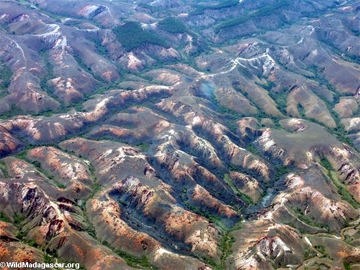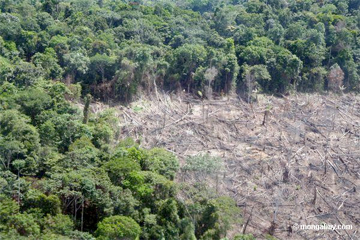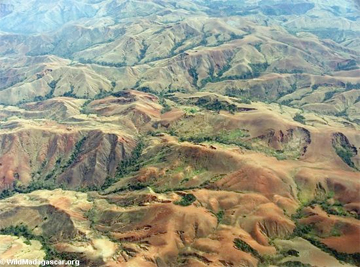Bipartisan support for including forest protection in a solution to climate change
The United States can reassert itself as a global leader on the environment by supporting an initiative to fight climate change by protecting forests, said leaders from a broad range of political, environmental, development and business communities at a meeting on Capitol Hill Monday. Joined by senators John Kerry (D-MA) and Richard Lugar, the “Avoided Deforestation Partners” coalition issued a “call to leadership” for Congress to include “strong tropical forest protection measures in U.S. climate change legislation” ahead of this December’s climate conference in Copenhagen, Denmark.
“Deforestation is a critical national security challenge because of its connections with threats from climate change and food security,” said Lugar (R-Indiana), the senior-most Republican in the United States Senate.
“I hope the United States will show leadership in elevating these issues during the upcoming international climate negotiations,” he continued, while noting that he is encouraged that groups with divergent viewpoints — including corporations, humanitarian groups, religious leaders, farmers, and environmentalists — are coming together on the issue.
 Avoided Deforestation Partners is calling for both market and non-market solutions to reducing emissions from deforestation and degradation (REDD). |
“Tropical deforestation must be a part of the debate on both climate change and national security,” added Kerry (D-Massachusetts), who currently serves as the Chairman of the United States Senate Committee on Foreign Relations. “Around the globe, millions of people have seen their land and livelihoods degraded by deforestation, increasing instability in already troubled regions. At the same time, deforestation continues to release billions of tons of carbon dioxide, accelerating the worldwide climate changes already occurring. America must set the tone for the rest of the world by including smart, effective forest protections in our own climate legislation this year and working to include international forestry provisions in the next international climate change agreement.”
International participants agreed.
“Without the leadership of the United States of America, everybody else will say, maybe this is not as serious as it seems,” Wangari Maathai, the 2004 Nobel Peace Prize winner, said during opening remarks. “If America is not concerned, then it cannot be a serious issue.”
“We need the U.S. to provide the leadership and I am most encouraged by the prominence President Obama has pledged to give climate change. If the U.S. doesn’t come forward, everyone else will hide behind you.”
Representatives from Indonesia, Brazil, Norway, and Papua New Guinea also said the world is waiting for the U.S. to step into a leadership role on climate.
Broad coalition
Noting that deforestation presently accounts for roughly one-fifth of carbon dioxide emissions — more than the entire transportation sector — presidents and CEOs from a variety of development NGOs, conservation groups, and American companies said that reducing deforestation would offer multiple benefits for the U.S. and the planet.
 More than 13 million hectares of forest are cleared every year. A larger expanse is degraded and logged. |
“Involving forests in climate is win-win-win,” said Mark Tercek, president and CEO of The Nature Conservancy. “It’s good for climate change, good for biodiversity, and good for economies around the world. Forests are being destroyed at rapid rates, and this solution will not be available to us if we wait too long. Forest protection is one of the most cost-effective methods available to fight climate change with the unmatched benefit of preserving biodiversity at the same time.”
He noted that avoided deforestation will give industrialized nations an opportunity to engage developing countries in climate talks and offer the U.S. a chance to reclaim its position as a global leader on the environment.
“The idea is to make good fast progress towards US and international carbon policy that promotes forest carbon offsets to protect and restore forests,” he said.
Peter Seligmann, chairman and CEO of Conservation International, added that forest conservation is essential to avoid the worst impacts of climate change.
“We can’t prevent the most dangerous impacts of climate change without conserving the world’s tropical forests,” Seligmann said. “Forests provide vital resources such as fresh water, food and medicine, and habitat for more than half of all the species on Earth. The United States should be at the forefront of protecting these vital assets, which are important not only for stabilizing the climate, but for ensuring the long-term security of all nations, including our own.”
Participants emphasized the potential benefits of “avoided deforestation” for forest-dependent communities, but cautioned that such groups must be included in climate discussions.
 Deforestation in Madagascar. |
“Many poor and marginalized groups depend on forest resources for their livelihoods,” Dr. Helene Gayle, president and CEO of CARE said. “Efforts to reduce greenhouse gas emissions will pay enormous benefits in the long-run, but only if the gains also accrue to the indigenous and other forest-dependent communities. To foster this cooperation, the U.S. and other Parties to the UN Framework Convention on Climate Change must uphold the rights of indigenous communities and help them safeguard their livelihoods.”
“We need to think about how these decision impact people who use forests,” she continued. “We must include them at the table.”
“Reducing deforestation must be a vital part of our overall climate change strategy, and if done right, it can provide real benefits to forest-dependent communities and indigenous peoples in developing countries,” added Ray Offenheiser, president of Oxfam America. “To seize that opportunity, we must put the rights and livelihoods of those communities at the heart of our efforts.”
Leaders of American industry also see opportunities.
“As a biologist I know that provisions to conserve tropical forests are an important part of a cost-effective climate strategy and should be included in new climate legislation,” said Michael G. Morris, chairman, president and chief executive officer of American Electric Power. “In 1997 our company, in partnership with The Nature Conservancy, launched one of the earliest projects [Noel Kempff in Bolivia] – and still the world’s largest project – to preserve tropical forests. These types of projects reduce the cost of climate action while protecting biodiversity and alleviating poverty by strengthening local communities.”
Arne Sorenson, CFO of Marriott International, cited his hotel chain’s recent investment in the Juma Sustainable Rainforest Reserve, a conservation project in the Brazilian Amazon. Though a low emitter of CO2, Marriott is helping protect 1.4 million acres of rainforest, reducing the potential emission of 190 million metric tons of greenhouse gases.
“Marriott is integrating environmental sustainability into our business strategy. Preserving rainforests is a centerpiece of our efforts,” said Sorenson. “We hope that the U.S. will act on its renewed environmental commitments this year by including strong forest protections in any climate legislation to protect these essential resources and address climate change.”
Stuart Eizenstat, the lead U.S. negotiator at climate talks in Kyoto, said that the time has come for the U.S. to lead on the issue.
“By valuing carbon stored in forests, the United States can lead the way to solve global climate change and protect forests and the people and species that depend on them,” he said. “What is required now is for the United States to take up the mantle of forest protection so that it will serve as a model to the rest of the world.”
Jeff Horowitz, founder of Avoided Deforestation Partners, said that while rainforests may seem like a distant concern to most Americans, they have a vital role in climate, water, and human-well-being. Further rainforests can be saved without compromising our economic recovery.
He closed the meeting by urging Congress to act quickly on forests and climate.
“Now is the time to take action. This event brought together those that can make a difference. We ask that we all work together to advance and implement a policy that will immediately begin to reduce carbon emissions on a global scale. The world is waiting.”
A Call for U.S. Leadership on Forests and Climate Protection [PDF]
Protecting tropical forests is critical to solving the climate crisis, enhancing our
security, protecting our economy, alleviating global poverty and creating
sustainable livelihoods.
The magnitude of the problem
As a result of human activity, the earth’s remaining tropical forests are disappearing at an
unprecedented rate, releasing billions of tons of greenhouse gases into the atmosphere. With an
acre of tropical forest lost every second, deforestation accounts for roughly 20% of global climate
emissions. Astonishingly, emissions from deforestation are doing more to deepen the climate
crisis than all the world’s cars, trucks, planes and ships combined. We cannot solve the problem
of global climate change if we do not address emissions from deforestation.
More than just a climate issue
Ending tropical deforestation is important for many other reasons as well. Forest loss and
environmental degradation can be major drivers of violence and armed conflict, displacing local
communities and undermining political stability. The World Bank reports that 90% of the rural
poor depend on forests for their food, fuel, water or livelihoods. Tropical forests are also home to
indigenous peoples and other unique forest-dwelling communities. More than half of the world’s
species live in tropical forests. Done right, with the necessary social standards and safeguards in
place, conserving forests would reduce climate pollution, decrease the vulnerability of forestdependent
peoples, improve living standards, promote political stability, preserve traditional
cultures and protect treasured natural places and species. For all of these reasons, forest
conservation must become an urgent international priority.
Opportunities for action
Conserving tropical forests does not require new and unproven technologies. All that is lacking is
political will, the right policies, credible standards and institutions, and clear economic signals.
U.S. climate legislation presents an opportunity to overcome these barriers by creating strong
incentives for tropical forest conservation while also protecting the rights and interests of forest
dependant people and ensuring equity in the distribution of benefits. At the same time, the United
States and the international community have a chance to make tropical forest conservation a central
component of the new global climate agreement nations intend to conclude by December of 2009.
Time is of the essence
We cannot afford to wait any longer. Absent dramatic action, most of the earth’s remaining
tropical forests will be gone in a few decades – exacerbating the risks of catastrophic climate
change, poverty and conflict. Right now – at this historic moment – we can conserve tropical
forests to help solve the climate crisis, safeguard our security and help the poor. But we must act
immediately.
We call upon the United States to:
1. Take a global leadership role in combating deforestation. Protecting
forests internationally should be part of a comprehensive U.S. climate policy
that ensures and prioritizes substantial domestic reductions in emissions.
Both in international agreements and domestically through its own laws, the
United States must fashion and advance policies that reflect the many
benefits of conserving tropical forests.
2. Advance a diverse set of solutions including market and non-market
based approaches. There is no silver bullet. The United States must pursue
a full range of environmentally and socially sound policy instruments and
incentives, including enhanced development assistance, improved forest
governance and expanded use of both public- and private-sector carbon
finance. All such approaches must protect the rights and interests of forest dependent
communities, include prior informed consent and ensure
equitable sharing of benefits.
3. Engage a wide range of stakeholders while crafting policies. Any
effective approach to the challenge of deforestation must involve the broad
spectrum of experts and stakeholders to develop sustainable, scalable and
equitable solutions that scientists, developing nations, indigenous groups,
local communities, civil society, and industry can support.
We the undersigned urge the United States to lead the effort in crafting
domestic and international solutions to end global deforestation to help solve
the climate crisis, enhance our security, save our planet’s biodiversity and
reduce global poverty.
List of supporters (as of February 2009)
1. Wangari Maathai – 2004 Nobel Peace Prize Laureate, Founder of the Green Belt Movement
2. Oscar Arias – 1987 Nobel Peace Prize Laureate, President of Costa Rica
3. Andrew N. Liveris – Chairman and CEO, The Dow Chemical Company
4. Carl Pope – Executive Director, Sierra Club
5. Carter Roberts – President, World Wildlife Fund, USA
6. Dean Hirsch – President, World Vision International
7. Frances Beinecke – President, Natural Resources Defense Council
8. Frank E. Loy – Former Under Secretary of State for Global Affairs
9. Fred Krupp – President, Environmental Defense Fund
10. Helene Gayle – President and CEO, CARE USA
11. Henry Paulson – Former U.S. Treasury Secretary
12. James (Gus) Speth – Dean of the School of Forestry & Environmental Studies, Yale University
13. Jeffrey Horowitz – Founder, Avoided Deforestation Partners
14. Jim Rogers – Chairman, President and CEO, Duke Energy
15. J.W. Marriott, Jr. – Chairman and CEO, Marriott International
16. Kathleen Kennedy Townsend – Environmentalist, Former Lt. Governor, Maryland
17. Kevin Knobloch – President, Union of Concerned Scientists
18. Kevin Conrad – Director, Coalition for Rainforest Nations
19. Larry Schweiger – President, National Wildlife Federation
20. Mark Tercek – President and CEO, The Nature Conservancy
21. Michael Morris – Chairman, President and CEO, American Electric Power
22. Nancy Lindborg – President, Mercy Corps
23. Peter Darbee – CEO, President and Chairman of the Board, PG&E Corporation
24. Peter Seligmann – Chairman and CEO, Conservation International
25. Raymond Offenheiser – President, Oxfam USA
26. Rob Walton – Chairman and CEO, Wal-Mart
27. Rodger Schlickeisen – President, Defenders of Wildlife
28. Stuart Eizenstat – Former Chief U.S. Climate Negotiator
29. Tensie Whelan – President, Rainforest Alliance
30. Teresa Heinz – Chair of the Heinz Family Philanthropies
31. Thomas Lovejoy – The Heinz Center
This initiative is being organized by Avoided Deforestation Partners on behalf
of a broad spectrum of for and non-profit groups that endorse this message.